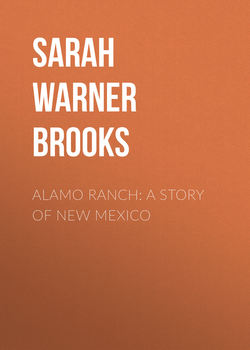Читать книгу Alamo Ranch: A Story of New Mexico - Sarah Warner Brooks, Sarah Warner Brooks - Страница 2
CHAPTER I
ОглавлениеIt is autumn; and the last week in November. In New Mexico, this land of sunshine, the season is now as kindly as in the early weeks of our Northern September.
To-day the sky is one cloudless arch of sapphire! The light breeze scarce ruffles a leaf of the tall alamo, the name tree of this ranch. Here any holding bigger than a kitchen garden is known as a ranch. The alamo, Spanish for poplar, lends here and there its scant, stiff shade to this roomy adobe dwelling, with its warm southern frontage and half-detached wings. Behind the house irregular out-buildings are scattered about.
A commodious corral, now the distinguished residence of six fine Jersey cows, lies between the house and the orchard, – a not over-flourishing collection of peach, apricot, and plum trees.
Here and there may be seen wide patches of kitchen garden, carefully intersected by irrigating ditches.
Near and afar, wide alfalfa fields with their stiff aftermath stretch away to the very rim of the mesa, where the cotton-tail makes his home, and sage-brush and mesquite strike root in the meagre soil. Cones of alfalfa hay stacked here and there outline themselves like giant beehives against the soft blue sky; and over all lies the sunny silence of a cloudless afternoon with its smiling westering sun.
Basking in this grateful warmth, their splint arm-chairs idly tilted against the house-front, the boarders look with sated invalid eyes upon this gracious landscape.
Alamo Ranch is a health resort. In this thin, dry air of Mesilla Valley, high above the sea level, the consumptive finds his Eldorado. Hither, year by year, come these foredoomed children of men to fight for breath, putting into this struggle more noble heroism and praiseworthy courage than sometimes goes to victory in battle-fields.
Of these combatants some are still buoyed by the hope of recovery; others are but hopeless mortals, with the single sad choice of eking out existence far from friends and home, or returning to native skies, there to throw up hands in despair and succumb to the foe.
Sixteen miles away the Organ Mountains – seeming, in this wonderfully clear atmosphere, within but a stone's throw – loom superbly against the cloudless sky; great hills of sand are these, surmounted by tall, serrated peaks of bare rock, and now taking on their afternoon array in the ever-changing light, rare marvels of shifting color, – amethyst and violet, rosy pink, creamy gold, and dusky purple.
The El Paso range rises sombrely on the gray distance, and on every hand detached sugar-loaf peaks lend their magnificence to the grand mesa-range that cordons the Mesilla Valley.
And now, out on the mesa, at first but a speck between the loungers on the piazza and the distant mountain view, a single pedestrian, an invalid sportsman, comes in sight. As he nears the ranch with the slowed step of fatigue, he is heartening himself by the way with a song. When the listeners hear the familiar tune, – it is "Home, Sweet Home," – one of them rallying his meagre wind whistles a faint accompaniment to the chorus. It is not a success; and with a mirthless laugh, the whistler abandons his poor attempt, and, with the big lump in his throat swelling to a sob, rises from his chair and goes dejectedly in. A sympathetic chord thrills along the tilted piazza chairs.
The discomfited whistler is but newly arrived at Alamo; and his feeble step and weary, hollow cough predict that the poor fellow's journey will not take him back to the "Sweet Home" of the song, but rather to the uncharted country.
And now the invalid sportsman steps cheerily on the piazza.
"Here, you lazy folks," mocks he, holding high his well-filled game-bag, "behold the pigeon stew for your supper!" And good-naturedly hailing a Mexican chore-boy, lazily propped by a neighboring poplar trunk, he cries, "Catch!" and deftly tossing him the game (pigeons from the mesa) goes in to put away his gun. When later he returns to the piazza, bathed and refreshed, it is as if, in a room dim-lit by tallow candles, the gas had suddenly been turned on to a big chandelier.
Seating himself in the vacant arm-chair, he fills a briar-wood pipe. Some of the loungers do likewise; and now, while they smoke and chat, look at the new-comer, Leonard Starr. Though not robust, he has the substantial mien and bearing of one who finds it good to live, and makes those about him also find it good. It is not long before most of these dispirited loungers are laughing at his lively stories and sallies, and cheerily matching them with their own.
Well is it for this troublous world of ours that some of its children are "born to turn the sunny side of things to human eyes."
